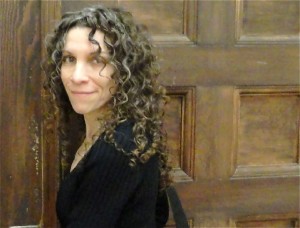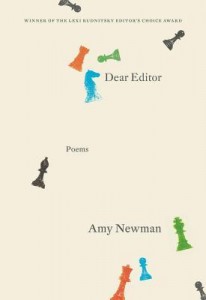 AMY NEWMAN is author of the collections Dear Editor; Order, or Disorder; Camera Lyrica; and fall. Her poems and essays have appeared in numerous journals and anthologies. She is founder and editor of Ancora Imparo: A Journal of Arts, Process, and Remnant, and Presidential Research Professor at Northern Illinois University. AMY NEWMAN is author of the collections Dear Editor; Order, or Disorder; Camera Lyrica; and fall. Her poems and essays have appeared in numerous journals and anthologies. She is founder and editor of Ancora Imparo: A Journal of Arts, Process, and Remnant, and Presidential Research Professor at Northern Illinois University. |
 Book Title, Press, Year of Publication:
Book Title, Press, Year of Publication:
Dear Editor, Persea Books, 2011
Synopsis: A book of poems in the form of cover letters to an invisible, distant editor.
What do you think makes your book (or any book) a “project book”?
The short answer for my book in particular might be in the form of Dear Editor: that the poems are all letters from the same “Amy Newman” to that editor—that formal element provides a visual suggestion of thematic unity. But there has to be movement, variation; within the harness of a formal constraint, there has to be a lively horse. So, theme and variation are probably essential elements in a “project book”: theme as in a unifying concept and variation as in movement. The idea of theme and variation isn’t exclusive to poetry books but spans the arts and sciences, each discipline’s approach offering different ways to think about creation and study. For example, in music, theme and variation are understood as “a modification with regard to the tune, time, and harmony of a theme, by which on repetition it appears in a new but still recognizable form,” or in physics, “a method for finding an approximate solution to Schrödinger’s equation by varying the trial solutions to find which gives the lowest value for the energy and is therefore closest to the true solution.” I can apply both of those definitions to drafting. Under each of those endeavors is the desire to study or increase looking or intensify the search, which I think is a part of any essaying in a field of endeavor.
I tend to read all poetry books from beginning to end, so I see many poetry books as an experience of theme and variation. Art is nature filtered through a temperament, to paraphrase Zola—the temperament of the writer is a unifying feature, filtering various elements through herself to a certain end, and the collection of that search is that book.
Why this subject (or constraint)?
I was in the process of drafting, and as usual, wondering about what makes a poem a poem. It’s not just line breaks; there’s an energy, a wondering, what R. P. Blackmur calls poetry’s “animating presence.” I think that when we write poetry, we think a bit differently, use our minds in a different way, dimensionally—and I suddenly realized that of course we don’t use the “poetry mind” in the cover letter; when we move from writing the poem to that process of writing the cover letter, we restrain that poetry mind. So one day I thought: what if, when she turns to compose the submission letter, the poet can’t turn off that part of the mind that’s involved in writing poems? And I started the poems then, as one of those warm-up exercises writers do. That it became a genuine form for the entire book probably has to do with what I learned in the process of drafting them each day, of learning from the character of “Amy Newman,” who is devoted to her practice, and thinking more fully about the act of submitting work as part and parcel of the practice of writing. She is determined; she is focused to the point where her practice has become a part of what allows her to be fully in the world. There’s something artful and disciplined about the whole shebang: writing, revising, thinking, reading, writing again, sending work out to that silence. Like prayer, poetry is a practice: in some ways obsessive and repetitive, moving from silence hopefully into something that resonates, that is heard.
In what ways was your project book designed or conceived before you started writing? And/or to what degree did the project develop organically as you added poems?
The project developed organically, I think you might say; it became a project after a few exercises. I wanted to see what would happen in the first few, and the voice of the “Amy Newman” became interesting to me. Why would she write this way? What was her deal? I realized quite quickly that I had envisioned a lot about her, or maybe it’s better to say I realized she was dimensional—I could see her house, the living room, the chessboard, I could see her looking outside to where the horse had been, and I could feel her longing, I saw that she was considerable—so I felt there was something there to pursue.
What self-imposed rules or constraints shaped your book (and the poems in it)? Did you allow yourself to break them?
The cover letter format is very much a template, and that’s a governing rule of her task, since she believed she was submitting these poems. Cover letters usually begin “Please consider these poems for publication. They are from my manuscript, etc.” Each letter for the most part follows this generic, personality-less template. Every time she tries to sum up her manuscript (in one of those “one-line sentences that summarizes the unifying principle”) she would have an opportunity to let that poetry mind in: “Please consider the enclosed poems for publication. They are from my manuscript, X = Pawn Capture, a lyrical study of the history of chess as my grandfather misrepresented it to me because he loved to tell his stories or, if you like the sound of this better, because I was too young to comprehend his indifference to me.” In attempting to summarize her poetry manuscript, she would be attempting to convey what was essential about her, though of course this is impossible.
She is very interested in girl saints, so I had to learn about them, and I consulted saint’s day calendars as a part of the day’s drafting, seeing which saints were honored on the days I was writing, and their biographies and what they were patron saints of. Did I break those constraints? At certain parts, I wanted it to feel as though she understood this activity of hers as an ongoing, private correspondence with the editor, so there are letters where she leaves off the opening line gambit, and just picks up the conversation that is going on in her mind.
How important was it for you that each poem could “stand on its own” or that the poems should rely on other poems in the book, or on the premise of the project itself, to succeed? What challenges did this present for you when writing single poems or structuring the book overall?
All poems should be significant in their own way, self-standing in that they have been crafted and the writer’s been attentive. In the best circumstances, a work comprised of somehow related, moving parts requires that each part works, but that the whole gains power in juxtaposition and accretion, like the poems in Plath’s bee sequence, or the movements in Bach’s Goldberg Variations. They can’t all be elegant gems; Randall Jarrell describes a poet as “a man who manages, in a lifetime of standing out in thunderstorms, to be struck by lightning five or six times.” But they should not be slack.
At any point did you feel you were including (or were tempted to include) weaker poems in service of the project’s overall needs? This is a risk, and a common critique, of many project books. How did you deal with this?
You know, every book has its stronger moments—poems of great clarity and essence, poems that might be understood to be essential— and moments that are perhaps less exquisite than that other poem. If you imagine that a project book differs from a non-project book, then we might imagine that there is, in the project book, a demand for coherence as well as movement, narrative, and so, by implication, the project can’t been composed of entirely the same tone throughout, the same one level of experience; it’s got to have changes in movement since it would otherwise be one note ringing.
Did you fully immerse yourself in writing this project book, or did you allow yourself to work on other things? How did the commitment and demands of the writing process inherent in a project book strengthen or complicate your overall writing process (and jeopardize your sanity)?
When I am in the middle of a project, I spend mornings writing until I’m satisfied that I’ve got some form of draft working. The rest of the day is spent doing other things, but it seems that I have an ear or an eye open for possibilities. In Dear Editor, for example, the world looked a bit different to me, filtered through the eyes of the speaker in that book, and so even feeding the fish in the neighbor’s pond, which was one of my tasks one week during a summer of writing, seemed like something that would have an effect on her. So it found its way into the drafting.

